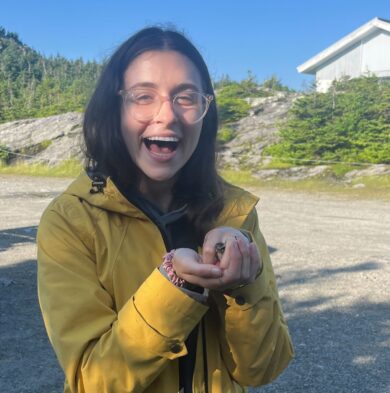 Halfway through the summer, I found myself near the top of Mount Mansfield. It was 5 a.m., the sun was just beginning to rise over the mountain ridges, and the damp morning fog was clinging to my clothes.
Halfway through the summer, I found myself near the top of Mount Mansfield. It was 5 a.m., the sun was just beginning to rise over the mountain ridges, and the damp morning fog was clinging to my clothes.
We sat in the parking lot, aspiring and practicing biologists curved like Cs over mugs of coffee as we waited out the fifteen minutes before our next mist-net check. In that quiet pause, I couldn’t help but marvel over how lucky I was to be paid for an experience like this.
This summer, I had the honor of serving as the Alexander Dickey Intern at VCE. Dickey was a young naturalist whose life was defined by curiosity, humility, and a profound love of the natural world. His story and reverent approach to ecological stewardship felt kindred to my own, and it was what initially inspired me to apply.
But even with our shared outlook on the natural world, my acceptance to this position initially felt more like a mistake than kismet. Of everyone I knew who deserved such a special opportunity, I felt the least qualified. I was bogged down by a limiting definition of success: x number of lab hours, y amount of fieldwork, z number of connections. Riddled with LinkedIn envy, I had done nearly zero fieldwork. And coming from New York City (where I helped rehabilitate pigeons, mainly), it felt like everyone else had an 18-year head start with outdoor experience.
But if my time at VCE has taught me anything, it is that being a good ecologist goes far beyond networking and experience. Two very simple ingredients go a long way in this type of work: passion and curiosity.
A genuine love of the natural world permeated every experience I had this summer, from loon monitoring to bird banding to weeding in experimental garden plots. Meeting people who love their work sprinkled magic onto whatever I was doing, no matter how mundane. I saw it in Eric Hanson, who, even after decades, still speaks about loons like they’re friends he never tires of visiting. I saw it in Desirée Narango, crouched in the dirt with us, her face lit up at the sight of an unusual beetle we’d found while weeding. Joy made everything feel purposeful.
Even better, no one batted an eye when I struggled to set up a tent or when I fell behind on a hike. Instead, I was encouraged, guided, and treated like I belonged. That sense of acceptance let me dig deep into the work I was doing rather than shrink away from it.
VCE was exactly what I needed to start my career: a soft place to land and a space to give shape and purpose to my interests. I started falling in love with unexpected things. I became interested in insect identification, staring at tiny details that once seemed invisible.
I learned to read landscapes more carefully: the quiet pocket of shoreline where a loon might hide, vegetation along a trail that made a perfect place for a mist net, the subtle signs of a bee hotel already occupied. More than anything, I learned the art of noticing … and how much life there is to pay attention to, if only you slow down.
One day, I sent my mom a photo of me holding a freshly banded bird. She texted back: “That’s the face of someone who’s found what they love to do.” I hadn’t realized it until then, but she was right. Somewhere during this summer, I’d stopped feeling like an imposter and began to feel like a real ecologist.
Read the entire Fall 2025 issue of Field Notes, fresh off the press, here. If you would like to receive a physical copy of the magazine, email .

This is exactly how I felt when I started my first “real” job as an owl tech in 2019! I still have the imposter syndrome but we have to drown it out with exactly what you said—passion and curiosity! We all start somewhere, and there is no better time to start than right now, as you are. Thank you for writing about your experience!
I love this so much. Thank you for writing such a wonderful essay. Welcome to the club 🙂
What a great article! Very inspiring. I wish Isabella the best in her future pursuits.
As someone who applied to this internship with similar intentions, it warms my heart to hear how much it positively served you. But I am certain of is that you are not alone in feeling two steps behind: maybe we are born in a place without much opportunity, maybe we find our passion later in life, or maybe some life event put things on hold. Any of these situations come with a lot of doubt, leaving us to question all the could haves, would haves, and should haves. As I try to pivot my career towards ecology, I often feel a decade behind other candidates who started on this journey many years ago. What I love about your story is how it highlights that working with the natural world is not (and should not) be defined by our previous successes. Instead, it should be continuously defined by our desire to do good, stay curious, and make a difference. Hoping your summer with VCE is the springboard you needed to move forward with confidence and find your dream job 🙂